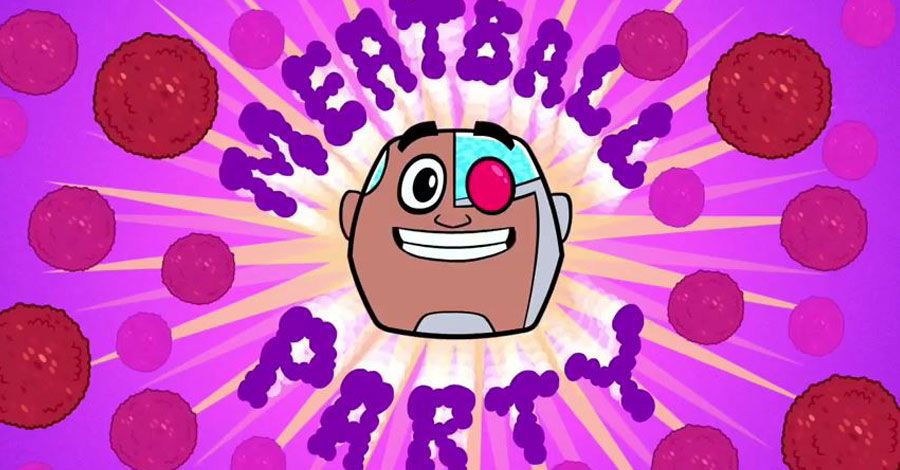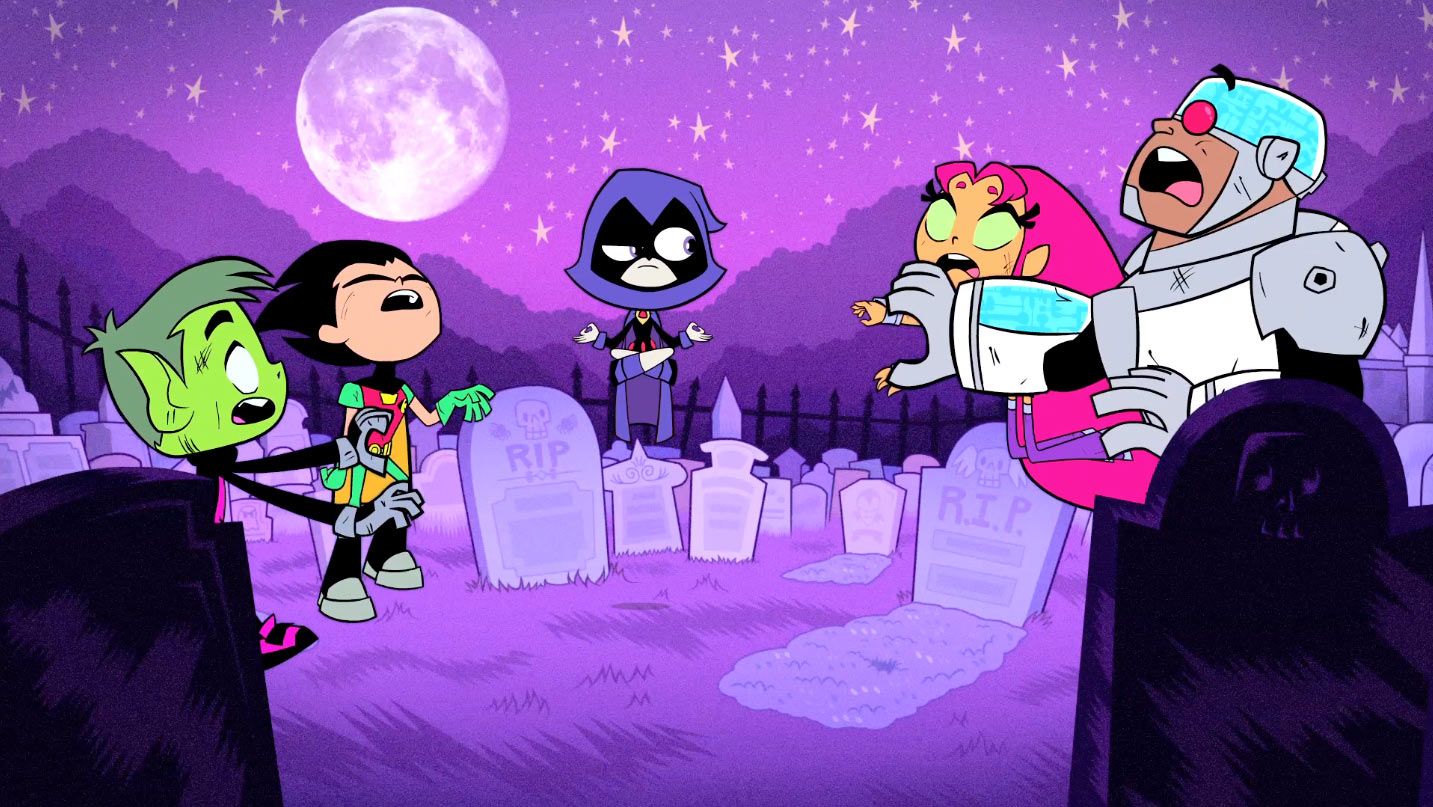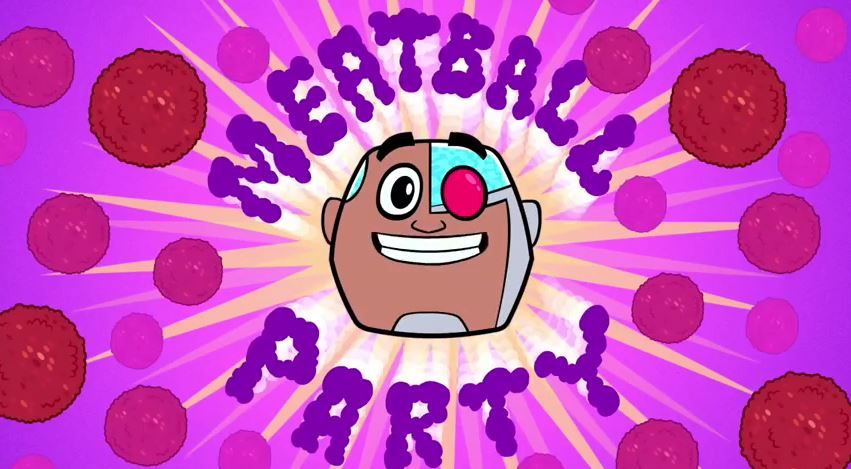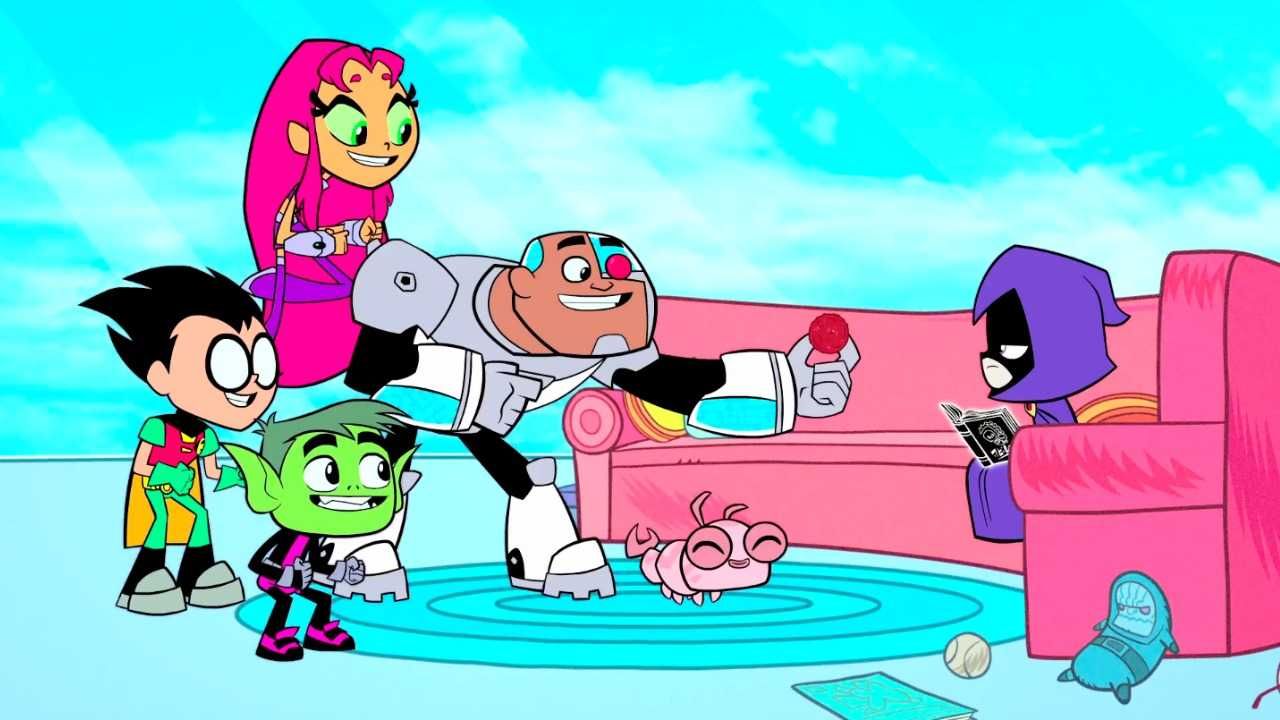If there's one thing "Teen Titans Go!" producer Michael Jelenic doesn't want to be called, it's "a filter," at least by his colleagues. Speaking with Comic Book Resources at WonderCon, a conversation about the show's continuing commitment to irreverent excellence was interrupted when his collaborator, Aaron Horvath interjected with what he thought their roles were, sending the duo into a hilarious spiral of debate over who, exactly, is the series' resident "genius," and who is merely its filter. If nothing else, the debate underscored the fact that they're both extraordinarily passionate about their roles on the show, which still maintains the intelligence and imagination that makes it such a hit with its audience.
RELATED: Payton, Jelenic & Horvath Get Wacky with "Teen Titans Go!"
Jelenic (and Horvath) spoke with us about his work on the hit Cartoon Network show, the positive aspects of "Teen Titans Go!" remaining a continuity-free series and their attitudes towards exploring the DC Universe in such a unique way. Jelenic also dove a bit deeper, laying out the challenges the writing team faces in telling their irreverent tales, not only remaining true to the core of the characters but also presenting them and their stories in such a way as to hopefully entice viewers to explore them in other media.
CBR News: You're very deliberate about this not being a continuity show. Would it be easier to come up with ideas or would it be more difficult if you actually tried to sort of maintain or develop a mythology that was part of a larger tapestry?
Michael Jelenic: Well, I will definitely say continuity shows are 100 times harder than episodic shows. I've worked with Greg Wiseman, who did "Young Justice," and he's known for doing continuity shows. You go into his office; he has this giant board, he has to map out everything. There's like 15,000 index cards so everything lines up and links, which is why doing episodic is a joy. You don't have to think about what happened before or what's coming up -- especially in a comedy, you just focus on what's funny and you're not necessarily paying off a character emotional relationships -- you're just trying to get the audience to laugh. For my stress level, I definitely prefer episodic.
Obviously, it's hard to assess the entire audience's reaction, but when you feel like the audience responds strongly to something, does that prompt you to feed that back into the machine of creating a new episode, or how independently do you think in terms of the continuity of the response?
Jelenic: The first audience for any of these episodes is the crew -- we make the show, and then we watch the episode. And if we react to it in a positive way, usually means that we're on to something. So even before the audience out in the real world looks at anything, we already have our opinions on, "Oh, this character's really funny, this story is really funny," and we'll go and revisit those characters, either because they're fun to write or fun to draw, and throw them in. In the second season, we throw in a bunch of characters that appeared in season one as sort of throwaway people, but they were fun and goofy and silly and so we put them in future episodes. We even wrote whole episodes around these characters, but we do that more with characters than storylines. We do have one sort of continuing storyline that we focus on, which is about Terra and Beast Boy and that sort of romantic relationship. We are building a world, but not with quite the same detail as some other DC Universe shows.
Aaron said that the meatball episode was this for him, but do you feel like you sort of fell into your wheelhouse with this sort of tone, given the transformation of the show and what it has become?
Jelenic: It might be the meatball party episode for me, too. I mean, up until that episode, we did some weird stuff, but it wasn't so surreal. I think we had a script and we had a deadline. We were trying to add something to the script to make it a little bit weirder, and we weren't sure what it was. We were taking a conventional story and trying to think it weirder. Aaron -- for weeks, he had been saying I want to do an episode about a meatball party, I want to do an episode about a meatball party. And in my brain, I'm like, that doesn't make any sense; that's a terrible, terrible idea. But then, faced with the deadline, it's like, let's try this meatball episode party. So we wrote the first part of that stuff in, like, half a day, and it was so easy! But it was so weird and absurd and it wasn't really something -- I don't think there has ever been a show about meatball parties before. Maybe there has. I don't know. But it sort of let both of us know, okay -- we can take these characters, even though they're established DC superheroes, into weird places. You would think these kind of ideas are better for original characters, but these characters, for whatever reason, lent themselves to the absurdity. After that, we started saying, "Let's see how weird can we go."
Are there any conscious or concrete boundaries of how far out you feel you can go with the creativity or the meta-storytelling?
Jelenic: I think our only boundary --
[Aaron Horvath sits down next to Jelenic] Now that he's here, I'll get to compare your answers.
Jelenic: Aaron is the genius behind the show.
Aaron Horvath: I would say that I am in the genius and you're the filter.
Jelenic: Wait a second. No, you can't say that.
Horvath: Like, you make my genius make sense.
Jelenic: That doesn't make sense. I am the genius and you are the filter. It's like being part of the cigarette you smoke, and then the smoke coming through. It doesn't make any sense.
Horvath: You focus my stupidity.
Jelenic: Well, I do focus Aaron's stupidity. Every show I work on, I work with different creators, and every creator has a different sort of place they're coming from. Aaron's tends to -- unlike most of the DC creators I work with, he comes from a more absurdist place, and I have an absurdist soft spot in my heart, so I think we latch onto that and I'm able to draw out his thing. But to answer your question, before Aaron sat down and ruined this whole interview, was, you know, what are the limits? I think for me, it's that the stories make sense. Even as crazy as we go, you tell a story that is grounded in some sort of logic that you could follow. Adult Swim, I think, thrives on just weirdness and randomness, and it's a funny fun form of comedy, but for us, we want to do stuff that sort of makes sense and has an internal logic, even if it appears to be no logic to it. That's the only thing I think that holds us back. [To Horvath] Is that okay?
Horvath: That was a great answer. That's similar to something I said.
Jelenic: I doubt it. You are -- "I'm the genius and you're the filter." That's the worst thing you could say. It's like you're the life-giving water and I am the little screen that picks up all the poop that goes through the water.
Horvath: No. No, no, no, no, not at all. Well, yeah, and there's a lot of poop. I'm a tainted pool of genius. Most of it is garbage.
Jelenic: More poop than a genius, how about that.
DC literally has volumes of material that you can look at any time. Is there an impulse to reference anything outside of the show, or are you guys pretty self sufficient or self-contained?
Horvath: I know what you want to reference.
Jelenic: All I want to reference is 1980s sitcoms that I'm fond of, so "Small Wonder," "Out of this World," "Charles in Charge." As far as DC references, we're deliberately trying to make a show that's not for older comic book fans. This is an entry point. We do occasionally reference broader ideas in the world of comics. Like, we have an episode coming up about, why does Robin wear a mask? Why is it important to have a secret identity? But we answer that question in our absurd way. We're not looking into, "Oh, let's do our take on 'The Judas Contract,'" or something like that. But what's our take on season four of "Webster?" We will do that.
That was a momentous season, as I recall.
Jelenic: Not as good as season 2 but, you know...
No. Well, what is? When I interviewed Seth Green for "Robot Chicken,", he admitted almost that his show might be doing a disservice to prospective fans of the source material by presenting this in almost an ironic fashion. How careful do you feel you have to be in terms of being true to these characters and having fun with them, yet not undermining the reasons that they're so iconic in the first place?
Jelenic: You know, at the end of the day, these characters are icons, and we have to protect them as a brand. But, even if I did the most ridiculous version of any of these characters that people found disrespectful or whatnot, the consumers vote by watching or not watching. And if it was such a terrible thing, no one would watch it and then that version would quickly be forgotten. The audience is the best decider of is it relevant or is it not relevant. If we put out this series and we thought it was great and nobody decided to watch, then that's them saying this doesn't work. But they watched it.
Conversely, I worked on like super reverent versions of characters like Wonder Woman. I worked on the Wonder Woman DTV, and that did not sell well. Was it because we didn't push it far enough, we didn't make it relevant for a new audience? Who knows. Or did people just not find it? I think there's basically room for any interpretation of any character. At the end of the day, it's up to DC, who they want to give these characters out to to play with. And you have to also remember, they're fictional characters. I know there's a lot of emotion that goes into them and I understand people love these stories, but sometimes I think it should be okay to mess around with them, poke a little fun at Batman or Superman. That will bring more fans to this stuff, and it might make them visit the more reverent material, too.
One of the things that Aaron said was that the challenge is keeping yourself interested, to be able to continually write. Do you feel like getting a sense of complete understanding of a character is either a central or antithetical to keeping yourself interested?
Jelenic: I think there is definitely a challenge; the longer you spend with a character, the more you know about them and the more you need to tell fresh, interesting stories, so you start searching. Sometimes, that search is successful; sometimes it's not, because you start going off on tangents and telling new stories. That's why think the comic books are so specific and the fan base is so specific, because they're no longer telling stories about bullets bouncing off Superman, because everybody knows that story, so they have to get very specific. They're going down these little tiny nooks and crannies of his mythology to find new stories. I think, for a mass audience, those nooks and cranny stories aren't as interesting as the sort of, you know, bullets bouncing off the Man of Steel. They're still good stories, and they're interesting, but, you know, the challenge is, how do you make those stories that you've already told, the obvious, most interesting stories, how do you make those other ones as interesting as possible for everybody. That's definitely a challenge, and the more you know about a character, the more you do want to go down that rabbit hole and tell various like weird stuff. It's a blessing and a curse!




